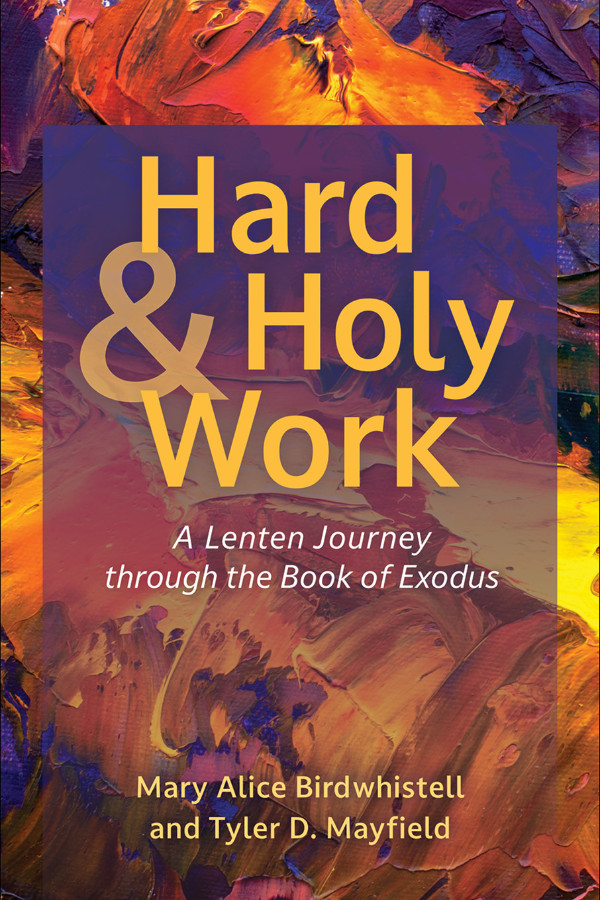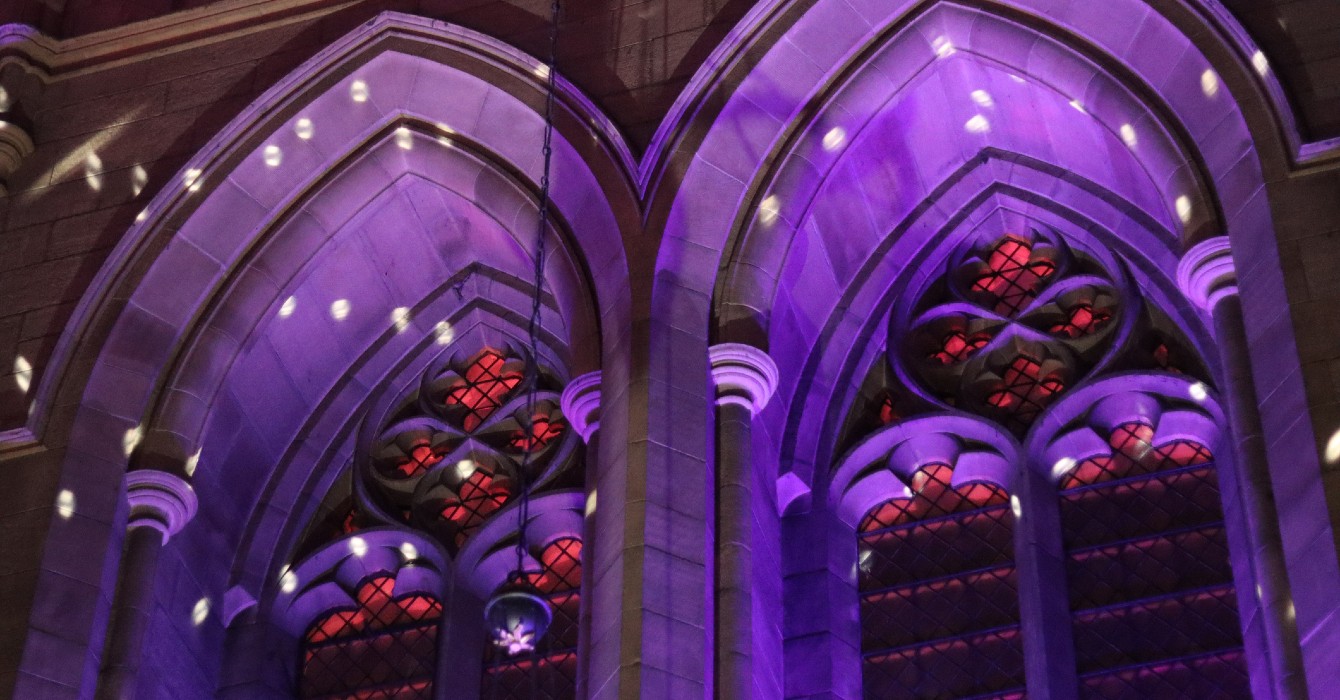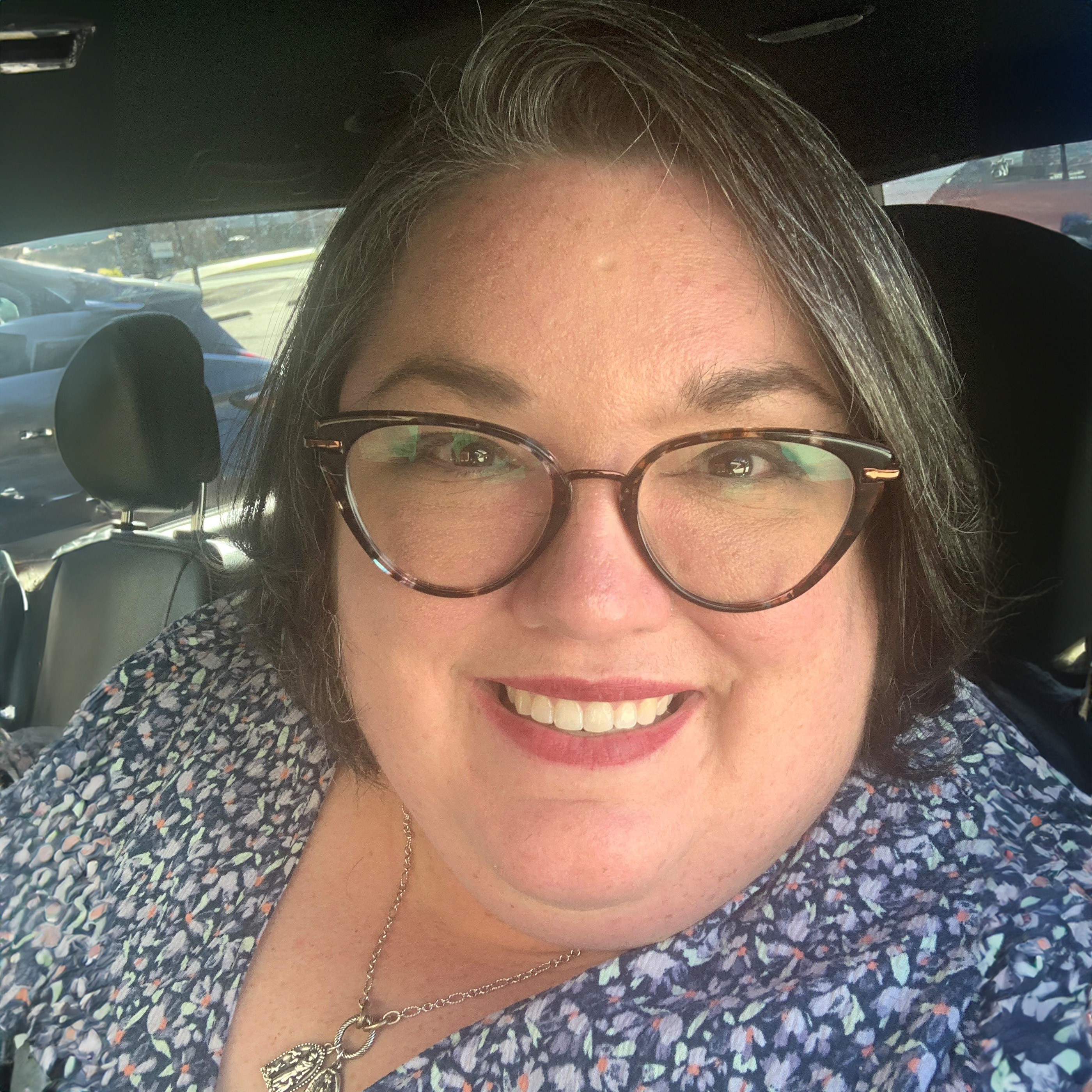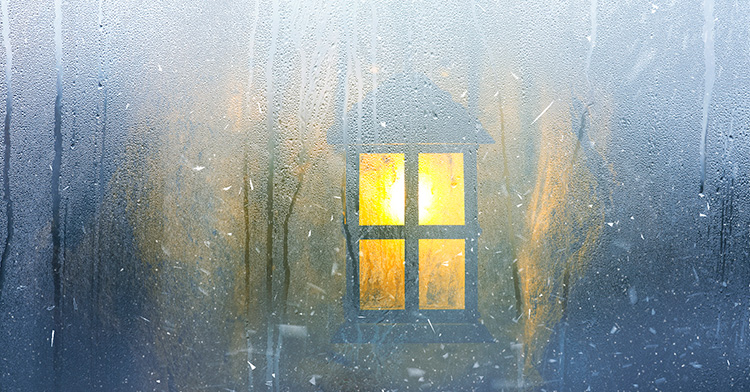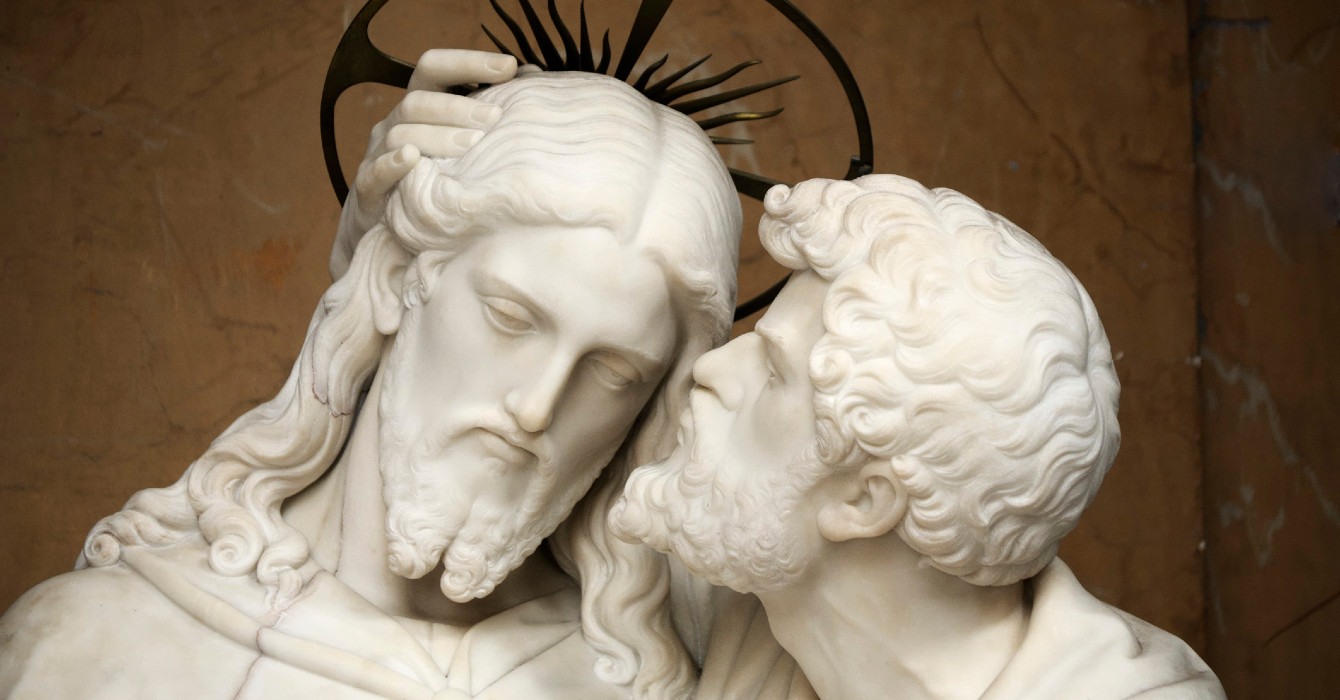The Rev. Mary Alice Birdwhistell and theologian Tyler D. Mayfield see theology, history and current events as interwoven.
“To me, it’s obviously all connected. I am a Bible scholar by training. To me, the Bible is not just a curious artifact from the ancient world. I think it is helpful to wonder about its historical context and to do all those great exegetical exercises and to try to situate it within its ancient context,” said Mayfield, the A.B. Rhodes Professor of Old Testament at Louisville Presbyterian Theological Seminary. “I [also] believe powerfully that it needs to speak into our lives today.”
Birdwhistell, the pastor at Louisville’s Highland Baptist Church, agrees.
“I think if your belief about the Bible being inspired is that it’s only inspired in the past, I’m not that interested in that,” she said. “But my belief is that the Bible is continually inspired, that we see new things each and every time we open it up that extend to our world today.”
Together, they have collaborated on “Hard & Holy Work: A Lenten Journey Through the Book of Exodus,” which leans into ancient text to help frame modern action. They spoke with Faith & Leadership’s Aleta Payne about their book. The following is an edited transcript.
Faith & Leadership: How did you come to write this together?

Mary Alice Birdwhistell: I came to Highland Baptist Church to be pastor there in the midst of the pandemic. I was preaching my first sermons in an empty sanctuary in August 2020. One of our associate pastors is Tyler’s spouse. Tyler and I connected pretty early on.
I was preaching on the book of Exodus, and I was really struck by how we were reading these ancient stories of liberation and yet crying out for liberation in our very own streets. Just down the road from our church was the gathering point for a protest for justice for Breonna Taylor. All of a sudden, this ancient world and our current landscape were intersecting.
Tyler is a professor of Hebrew Scripture and was interested that I’m preaching on Exodus and really wrestling with what this ancient text means for us in a contemporary way. Tyler said, “Hey, have you ever thought about writing a book on this? Maybe this is something we could do together.”

Tyler Mayfield: I’m always pleased when preachers select the Old Testament to preach on. And in this particular series, Mary Alice wasn’t just preaching one passage one time on one Sunday, but there was a whole series on Exodus. As she just said, it was resonating with what was going on in our city and in our nation.
One piece that I think is really important that Mary Alice lifted up in that sermon series is she noted how the book of Exodus has oftentimes been sort of censored from certain groups of people, including enslaved folks here in America, because there was this sense that this story was too powerful, it had too much resonance with their own lives, and so they shouldn’t be allowed to read it, to study it and to think with it. And yet it’s so central to the Black church despite that sort of censorship.
What might we at Highland Baptist — which is a very middle-class, white congregation — how might all of us learn from these stories that have been so central to the Black church tradition?
F&L: Exodus is not where we typically spend a lot of time in Lent.
TM: Right? When we wrote the first draft, it was not tied to a particular liturgical season. We had kind of pitched it as just a general Bible study. Westminster John Knox (the publisher) suggested … tying it to either Advent or Lent. This felt “Lenty” in the sense that there are themes of wilderness and journey and being on a journey. They asked us if we could go back through the manuscript again and shape it into a Lenten journey.
It really shifted our thinking. Exodus does not occur very often as one of the prescribed readings during the Lenten season. It was a fruitful way for us to think about the book and to think about the study that we had originally written, to put it within this context.
MAB: Lent can often be a really introspective season of personal study — giving something up for Lent, solitude — and we wanted to tie the spiritual formation components of Lent with this call to action. We think those are really so wedded together. You can’t have one without the other. But so often, I feel like we have people who would say, “I’m a more spiritual person of faith” or, “I’m a more social justice person of faith.” We might identify ourselves as being in one camp or the other. And we tried to say all throughout this book that these things beautifully flow into and out of one another. What if the journey of Lent could be drawing us into that interconnected relationship?
F&L: You end each section with three types of Lenten practice: paying attention, sharing together, taking action. Is that the motivation there?
MAB: Absolutely. The image of the burning bush was our focal point for that very idea. How many sermons have we heard where the burning bush calls us to look around and realize that we need to take our shoes off, that we are standing on holy ground? That’s a beautiful message, and yet the story doesn’t end there, because right after that, God calls Moses to go to Pharaoh and to deliver the Hebrew people. You have this moment of awakening that immediately leads to action. We wanted each week to provide concrete and tangible ways for folks to do that.
TM: We thought a lot about those questions. Sometimes in Bible studies, authors are asked by their publisher, for example, to include study questions at the end, and they sort of begrudgingly create these questions that are almost reading comprehension questions. We wanted this to be a really important part of the work of Lent, so that structure is intentional — the structure of having questions for individual use but also having questions for groups and even thinking about how those questions might build on each other.
We really are asking people to do something during the week. It’s not just a thought exercise; it’s not just meeting with your group and talking with them. We try to be very practical and very concrete in the suggestions and also manageable actions.
Oftentimes, I think people are overwhelmed by the injustice they see and they don’t know how to respond to it and they feel like what the response needs to be is a really big life-changing action step. That may not be what they’re able to do in their context. We really wanted to think about appropriate actions.
F&L: There are two themes I’d like to talk about a bit more. One is Day 2 and messiness; the other is taking the next right step.
MAB: I’ll start with the Day 2 concept. We pulled this from some of Brené Brown’s work, where she does these trainings with all sorts of different groups, organizations, and she talks about how Day 2 of this training started getting really messy and she started having staff come to her and say, “Hey, I think we need to skip Day 2 or rework the curriculum — it’s too hard; it’s too complicated.”
She uses that as a metaphor for how we get stuck in the middle of a situation. There’s that point where you’re too far in; you can’t go back, but you can’t really see the light ahead either. You’re just in the messy middle of it, and there’s no end in sight.
Where do you go in those times? I think we were really feeling the messiness of that as we were writing, because this is in the midst of COVID, and we’re [wondering], “Is there any kind of end in sight?” But then we’re also wrestling with these situations of injustice. We are in the midst of this long-overdue racial reckoning in our country and yet feel like we’ve barely taken any steps forward. We realized that it’s so easy to despair on Day 2 and to feel like throwing your hands up in the air.
That resonated beautifully with the Israelites in the wilderness: “We can’t go back to Pharaoh, but we’re stuck in the wilderness.” Maybe they’ve just crossed the sea, and yet there’s no food, there’s no water. “God, why’d you bring us out here in the midst of this just to die in the wilderness?” Again, it was the intersection of this theme in the text and this theme in the world around us to not despair in the midst of the wilderness, in the midst of Day 2.
TM: I see and visit churches regularly who are in the messy middle. They have maybe made commitments on Day 1 that were well-intended and ultimately good commitments, and they are seeking justice in the world, and they are committed to that. Then they take the next step of trying to figure out what that looks like in their own church, and they begin to ask harder questions about what they look like and what their leadership looks like and what their church is doing to impact their neighborhood.
It gets messy pretty quickly, and there oftentimes are just not easy answers or quick fixes. Churches or individuals will see an injustice in the world, and maybe they’ll read up about it and learn a little bit more about it, but it’s difficult to find their action step.
It’s difficult for them to learn how to plug in to that and actually make a difference. They absolutely want to make a difference. It’s not a lack of will, and sometimes it’s not even a lack of knowledge. They know oftentimes what their commitments are, but how do they actually create change?
I just talked about it in the sense of people often think they need to take a large step to bite off a huge chunk of injustice and try to digest that. I don’t think that’s always the most successful way to do it.
Emily Freeman has written a book called “The Next Right Thing.” She talks about how, in the Gospels, Jesus often tells people the next small step that they can do. We were really working on that kind of idea and relating it to Exodus and relating it to the church.
MAB: I think back to when the Israelites are stuck. They’ve got Pharaoh’s army coming at them from one side, they’ve got the sea on the other side, and they don’t know where to go or what to do. We always have these images in our minds of the waters parting and this miraculous moment, but as we unpack the Hebrew midrash, the retelling of this story, [we see] how actually the people took the first step before God parted the waters.
It was this pairing together of a people willing to take a next brave step and a God who works with us. That is what led toward liberation. That just gives me goosebumps, that God doesn’t do these miraculous things apart from us but that God chooses to do the work of liberation with us, and that when we have the courage to just take that next brave step, God meets us there.
F&L: You talk about people in places of privilege being eager for a quick fix or an easy solution to systemic racism. You say it’s not that easy, so do the piece you can and move it forward in smaller steps.
TM: I know of churches that are involved in this long work of anti-racism, and Highland Baptist in Louisville is of course involved in this. I think there’s a pretty distinguishable pattern for white people when they come to this conversation. Oftentimes, because of their privilege, they have been blinded to this injustice, this systemic racism. Something opens their eyes to it, and they see it for the first time, or they see a piece of it for the first time.
Many of these white people, when they see that, they know that’s wrong, they feel that’s wrong, they sense that’s just not fair. But then out of their privilege and the fact that they have been taught by culture that they have power, they have agency, they have the right answers, … their immediate next step is, “We should fix that,” and [they believe] it’s fixable pretty quickly.
“If I just gather a couple of friends together or we get a committee of the church together, we can do something about that.” It’s all well-meaning, but that’s where ultimately it’s going to falter and fail, unless these people quickly realize that we are talking about generations and centuries and we’re talking about deep systems of oppression and thought. So what is yours to do in your particular context? Again, I’m thinking about your neighborhood and your moment in time, right?
Otherwise, I think you’re going to be overwhelmed and you’re going to walk away. I’ve seen that happen many times before, where people go, “You know what? This is too big a problem. I can’t do anything about it.” So they walk away from it. That’s really a shame, that they have had this moment of awakening that has ultimately led them to disappointment or resentment or wherever they end up at the end of that process, because they felt like they couldn’t make a difference. How can we interrupt that kind of process?
MAB: I’m almost envisioning this interconnected eight that’s looping back and forth. I think our hope in the book is that these moments of awakening lead us into action, and yet we also can’t stay over here in action. We’ve got to loop back into awakening to be reminded of these truths, to be restored for the journey.
We have a chapter on Sabbath and rest and how that is really an act of resistance, because it keeps us going. And how often we get stuck in either loop, whether it’s “I see the injustice of the world, and I want to fix it, I want to fix it, I want to fix it” or “I want to think about it, think about it, think about it.” Our action and our awakening always have to be calling us into and out of one another.

